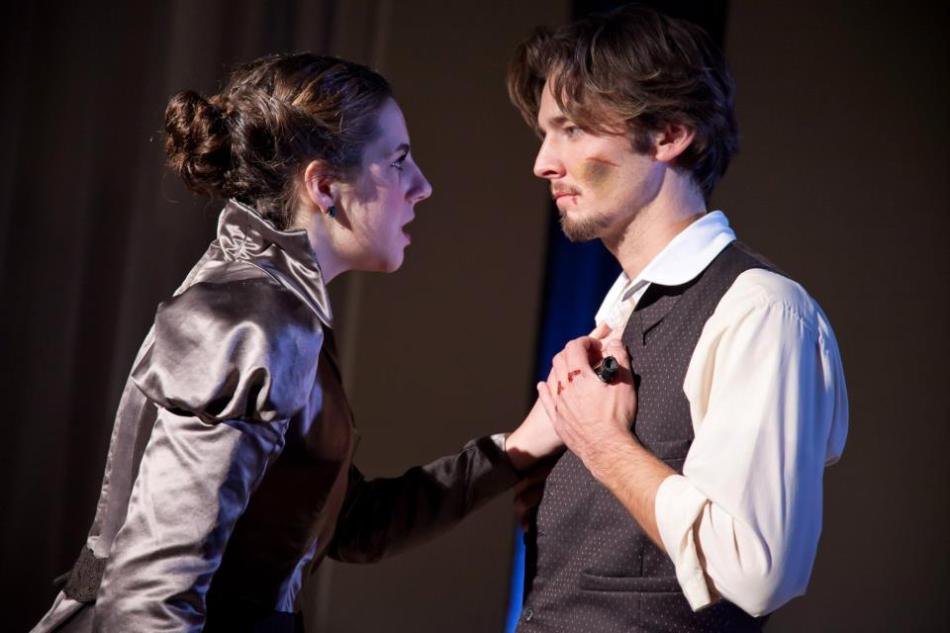Approaching Eilert Loevborg with Patrick Flannery, interviewed by Marian Donahue
(Pictured From Left: Amy Horan and Patrick Flannery)
Photo by c. Stanley Photography
Patrick Flannery is a Senior Drama Major at the Catholic University of America. He is playing the role of Eilert Loevborg in the current production of Hedda Gabler.
How did you approach your character? Did you get an initial impression from the reading? Or did you connect with it more once you started getting it on its feet?
Well, first impression…I had read the play before it was even announced that we were doing it. But my first impression probably came from the director’s character breakdown that they send out before auditions. And the things that Eleanor [Eleanor Holdridge, Head of CUA Directing and director of this production] said in that, you know, Eleanor’s very good at character breakdown, at getting the crux of every character. Phrases that she said were like, “He’s got a wild imagination” “Burning with an inner fire” “Thin and a little transparent around the edges” Those sorts of phrases are what formed a very very basic frame for the character for me. And yeah, once you start reading it with an eye towards a specific character that kind of gets built up.
Were there any surprising developments or changes that you found in the character as the rehearsal process went on?
The short answer is, no. Because with the character breakdown, it always seemed clear to me where Loevborg as a character was and where he went. What did change was my own personal approach to this character in particular and sort of to the process in general. I am a very negative person about my own work. I used to hate everything I did. When you are critical of yourself onstage it prevents you from getting to places where you need to be as the character. So there came a point where it became pretty clear that the negative Patrick had to die. So, he was killed. Within the process there’s, for me, been more of a change in just letting the character take over in a sense and not trying to, as an actor, dictate what that character does, but really trying to just be open to what’s going on as the character and just letting the frame work in the moment to moment.
One of the more important relationships that you have is the relationship with the title character Hedda, and like you mentioned, you don’t have a vast amount of time onstage. So how do you produce that kind of relationship in such a short amount of stage time?
Well it defiantly helps knowing Amy [Amy Horan, senior drama major and playing Hedda Gabler], having been in scenes with her in different classes, and having a relationship with her in life has helped. So when we started there was already an immediate comfort there and once there is a comfort between actors that’s going to come through in the characters. But it is difficult to try to convey all the backstory between Hedda and Loevborg in that short amount of time, but again it’s just letting Ibsen do the work for you, it’s there, it’s in the language, it’s in the objectives that are indicated by the text so as long as you trust that then hopefully it will come through to the lines.
You talked before about “it’s all present in the language”, how much time do you spend going through the language and looking at it analytically?
A lot, defiantly a lot. Once I found out this is the play they were doing and I knew I wanted to audition for it, then I spend most of the summer just reading the play over and over again. Sort of breaking down, for every character, what was happening. I think it’s important to put in a lot of work beforehand so that when you are cast and you start with a specific character… all that analytical stuff can’t dictate what you do as a character but it’s all back there and it all informs and lies underneath everything that you do onstage. I spend a lot of time doing that and I think it’s one of the most important things that actors should do
And you do that with every part?
Absolutely. Obviously if I know that I’m looking at a specific character then I’ll spend more time on that character. But I think it is helpful to do in general, so you have a sense of a complete world when you come into an audition so you’re not just doing a monologue or a little two minute scene between you and another character, you can put that into the context of the play and everything that’s happened. Obviously that won’t be performance ready, what you do in the audition, but I think that it’s critical.
Marian Donahue is a Senior English Major at the Catholic University of America.

